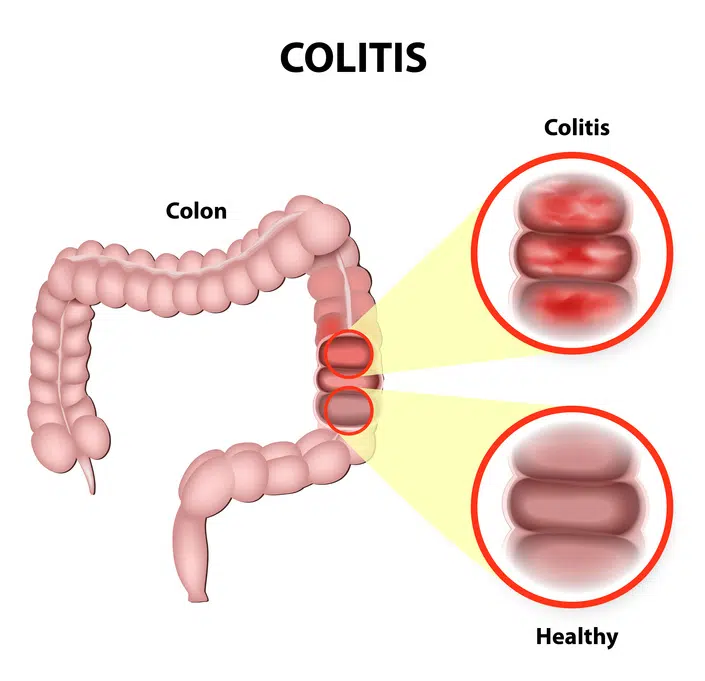Symptoms of Leaky Gut Syndrome
Leaky gut is a condition that impacts the lining of the intestines. When you have a leaky gut, gaps form...
Get Relief From Inflammatory Bowel Disease
Crohn’s disease is another type of Inflammatory Bowel Diseases (IBD). It can affect any part of the Gastrointestinal (GI) tract as compared to Ulcerative Colitis that mainly affects the colon. Crohn’s disease can affect all layers of the bowel wall while Ulcerative Colitis affects the lining of the colon.

Ulcerative colitis is one of the most common types of inflammatory bowel disease. This chronic disease causes inflammation and ulcers in the lower intestine. The ulcers usually form in the lower sections of the intestine, including the sigmoid colon and the rectum; however, it can affect the whole colon. The more area of the colon that is affected, the worse the symptoms can become.
Although experts are not sure what causes ulcerative colitis, they speculate that it may be caused by the immune system attacking normal bacteria within the digestive tract. Other experts believe heredity can play a role in ulcerative colitis. This condition is common along family lines; however, even those with no family history can develop ulcerative colitis.

This chronic condition has numerous risk factors. Just as many men as women develop ulcerative colitis over their lifetime. The following risk factors are associated with colitis:
Age – Most cases of ulcerative colitis are diagnosed in adolescents and young adults; however, it can occur at any age. Some surmise this may be due to the eating habits of the younger generation.
Race – Inflammatory Bowel Disease often occurs in those with European and Jewish descent.
Family History – Those who have a family history of inflammatory bowel disease are at an increased risk of developing this painful digestive disorder.
Medications – Medications can increase the risk of developing ulcerative colitis. These medications include oral contraceptives, synthetic hormone replacement therapies and acne medications.
Place of Residence – Where you live can contribute to a higher incidence of inflammatory bowel disease. Those who live in the United States and Europe have a higher risk of developing ulcerative colitis. Experts think this may be due to certain lifestyle factors, including pollution, diet and cigarette smoking.

The symptoms of ulcerative colitis and Crohn’s vary depending on the amount of inflammation and the location of the inflammation. Most sufferers experience only mild to moderate symptoms. Additionally, many patients have periods of remissions when symptoms subside completely. During inflammation, you may experience:
Severe cases of ulcerative colitis can cause complications. You may experience severe bleeding that can cause complicated anemia or blood clots. A perforated colon, which occurs when a hole develops in the colon, can cause pain and can lead to colon cancer. Inflammation can occur in your joints, eyes and skin. Additionally, you may experience sores inside your mouth. Finally, severe dehydration, bone loss and liver disease can occur with ulcerative colitis.

Ulcerative colitis is a painful condition that affects the large intestine, colon and rectum. Here are some natural approaches to ease the symptoms of ulcerative colitis-

Are you unable to manage your symptoms of Ulcerative Colitis or Crohn’s? Our functional medicine practitioners specialize in treatment of Inflammatory Bowel Diseases and can help you restore your GI health and experience a fulfilling life once again. We use a functional medicine approach to help identify root causes and create a customized treatment plan based on your health condition as well as family history, lifestyle, and diet.

Symptoms of Leaky Gut Syndrome
Leaky gut is a condition that impacts the lining of the intestines. When you have a leaky gut, gaps form...
Most people have heard the term autoimmune disease; however, many do not understand the depth and breadth of this diagnosis....
An elimination diet involves removing foods from your diet that you feel are causing a problem. An elimination diet is...
Tips to Treat Menopause Naturally
Menopause is an important milestone in every woman’s life. Still, it can also be challenging to deal with, especially when...
The thyroid is a butterfly-shaped gland located at the base of your neck. This powerful gland controls many of the...
Fibromyalgia Syndrome is a medical disorder characterized by widespread musculoskeletal pain, mood issues, sleep problems, fatigue, and memory issues. Research...
7 Symptoms of Estrogen Dominance
Women must navigate varying hormonal imbalances and changes throughout their lives. From puberty to pregnancy, perimenopause, and menopause, fluctuations in...
What is a Yeast Infection? Yeast lives on your skin and in your body. Your immune system usually keeps yeast at...
Polycystic ovary syndrome, or PCOS, is a hormone disorder affecting women who are of reproductive age and beyond. It causes...
Menstrual migraines, also known as hormone headaches, typically occur either right before or during a female’s period and often happen...
Try the quick 5 minute quiz to learn more about your health
Top 10 Supplements for Joint Pain and Inflammation
Approximately fifteen million individuals in the United States experience severe joint pain, while almost half of the American adult population...